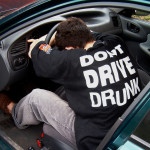It's not just good parenting, it's a matter of life and death. Parents need to start talking to their kids about traffic safety early and often--before they reach driving age. When teens do begin driving, the U.S. Department of Transportation and the National Highway Traffic Safety Administration (NHTSA) recommends that parents set rules and define and enforce the consequences if the rules are broken.
Driving is a privilege and to keep that privilege, teens must follow the rules. Getting through to teens isn't always easy, but research shows that teens do listen to their parents and that they can influence driving safety habits. Parents should lead by example and practice safe driving behaviors whenever their children are in the vehicle.
Distracted Driving is on the Rise...In 2015, 3,477 people were killed in motor vehicle crashes involving distracted drivers. According to the Insurance Institute for Highway Safety, drivers who use hand-held devices are four times as likely to get into crashes serious enough to injure themselves. Below are the main issues that NHTSA believes should be addressed once teens start driving.
RULE 1: PUT IT DOWN!
Young drivers under the age of 20 are especially at risk of distracted driving. Their lack of driving experience can lead to critical misjudgments when they are distracted. Not surprisingly, they text more than any other age group and the numbers continue to increase.Parents should talk about the risks associated with texting or talking on the phone while driving and make their expectations clear.
RULE 2: ABSOLUTELY NO ALCOHOL!
In 2015, 9,306 people died in drunk driving crashes - 28 every day. In 2013, there were 3,966 young drivers 15 to 20 years old who were involved in fatal crashes — 29 percent of the young drivers who were killed in crashes had BACs of .01 g/dL or higher; 24 percent had BACs of .08 g/dL or higher.
The statistics prove it; alcohol and driving don't mix but it's especially important for less experienced drivers to never get behind the wheel after drinking. Make it clear to your teenage drivers that drinking and driving will not be tolerated under any circumstances.
While blood-alcohol level determines the severity of the offense in New York, any amount of alcohol affects a driver's judgment and coordination. And even first time offenses for drinking and driving carry stiff penalties and significant costs. Here is a sampling:
-
Towing: $100+
-
Car Storage (per day): $45+
-
Defense Attorney: $500-$1,500+
-
Bail Fee: $0-$250+
-
Fine: $300-$2,500
-
Court Surcharge: $140
-
Alcohol Evaluation: $90+
-
DWI Victim-Impact Panel Session: $25
-
Probation Supervision Fee: $0-$250+
-
Conditional License: $75
-
Drinking Driver Program Fee: $225
-
DMV Civil Penalty: $300
-
Ignition-Interlock Installation (per vehicle): $200
-
Ignition-Interlock Rental ($100 per month/vehicle, minimum 6 months): $600+
-
DMV License-Reinstatement Fee: $50
-
Auto Insurance (additional cost per year): $2,000-$3,000
-
Total Cost for a First-Time Offender: $4,650-$9,350+
RULE 3: ALWAYS BUCKLE UP!
In 2015, 55 percent of the passenger vehicle occupants (ages 13-21) who were killed in traffic crashes were not using restraints — the highest percentage of all age groups.
RULE 4: HAVE THE CAR IN THE DRIVEWAY BY THE DESIGNATED TIME!
More teens are in fatal crashes during nighttime hours than during the day. Almost 70% of occupant fatalities in the 16 to 20 (68%) age range were unrestrained during nighttime.
RULE 5: NO MORE THAN ONE PASSENGER IN THE CAR AT ALL TIMES!
Most teens are susceptible to peer pressure, which often leads to risky behavior. In a survey completed by the Allstate Foundation, 47% of teens polled said they are sometimes distracted by passengers and nearly as many said they drive more safely without friends in the car. Research shows that the risk of a fatal crash increases in proportion to the number of teenage passengers.
RULE 6: FOLLOW NEW YORK STATE'S GDL LAWS!
Immaturity and inexperience are some of the primary contributors to fatal crashes by teen drivers. Graduated Driver Licensing laws address these factors by reducing high-risk exposure for novice drivers. Studies clearly show the benefits of GDL laws with 20% to 50% reductions in crashes of young novice drivers.
RULE 7: FOLLOW THE HOUSE RULES OR FACE THE CONSEQUENCES.
Parents need to set "house rules" for their teen drivers and define consequences that will be enforced. This can be done with a parent/teen contract or by having a continuing conversation about your expectations and consequences. Don't worry if your "house rules" exceed what state laws provide. You're not being strict, you could be saving your children's lives.
For more information, please visit:
Related Posts
Drink OR Drive – YOU CHOOSE!
The holiday season is right around the corner. As Americans prepare for festivities with family and friends, the National Highway Traffic Safety Administration wants to remind all drivers that it’s dangerous to drive after drinking. You have to choose your role before drinking begins: will you drink or will you drive? Remember, even if you […]
“5 to Drive” Campaign Helps Parents Protect Teen Drivers
Alliance for Safe Kids (ASK) is joining with the National Highway Traffic Safety Administration (NHTSA) to promote the “5 to Drive” campaign during National Teen Driver Safety Week. The campaign aims to help parents talk to their teen drivers about the rules of the road. “Even though your teens might be gaining some independence and […]
One Text or Call Could Wreck It All
Unfortunately, distracted driving is not a passing fad. It has become a trend with deadly, real consequences. For anyone who thinks they can talk on their phone, text, apply make-up, or do any other distracting activity while driving, it’s time for a crash course in reality from the National Highway Traffic Safety Administration (NHTSA): In […]
Yorktown Police Department Will Be Out in Full Force to Catch Drunk Drivers
As summer winds down, the Yorktown Police Department is ramping up its enforcement efforts as part of a national crackdown on drunk driving. The 20-day, high-visibility campaign, Drive Sober or Get Pulled Over, is a partnership with the National Highway Traffic Safety Administration (NHTSA) to curb impaired driving and save lives. August 21-September 7 (Labor […]







